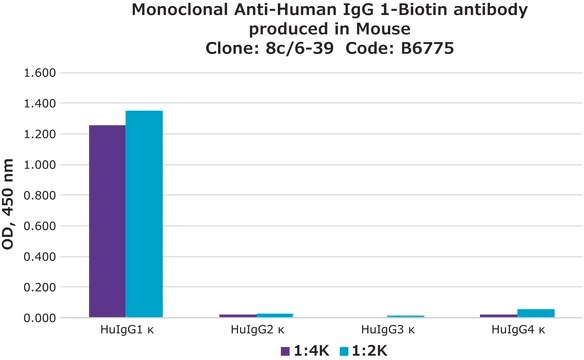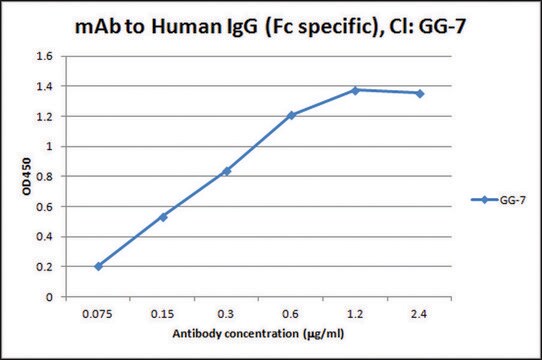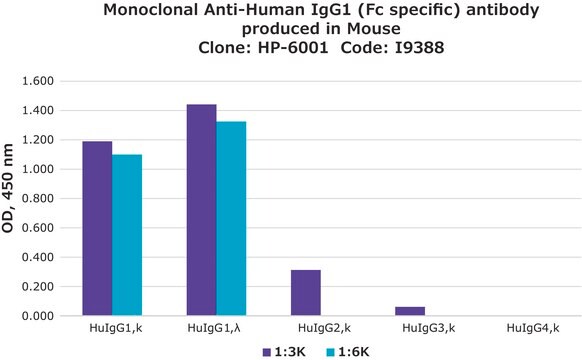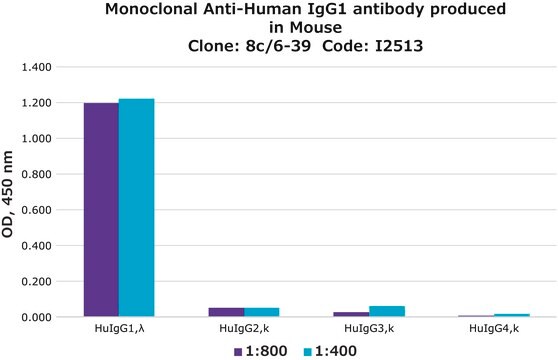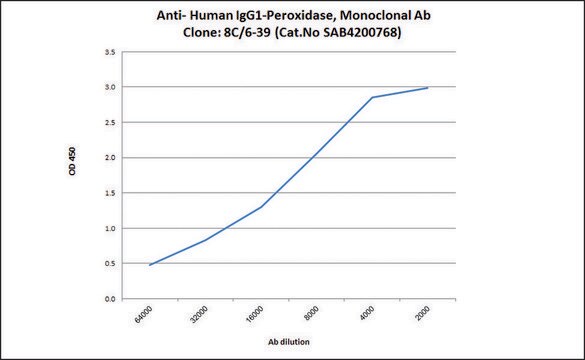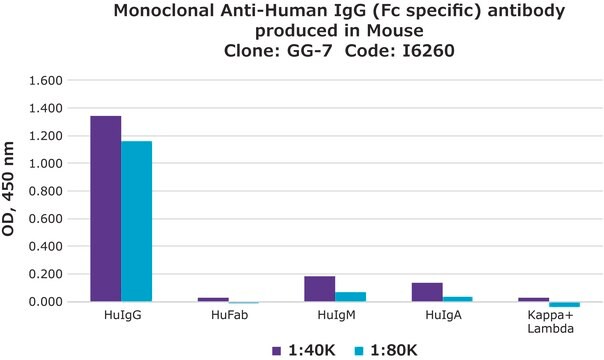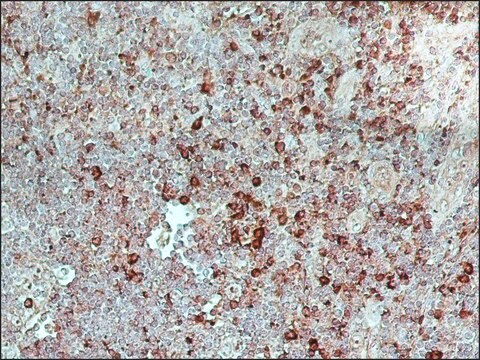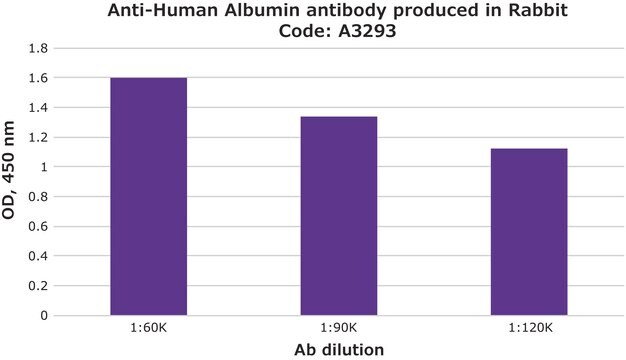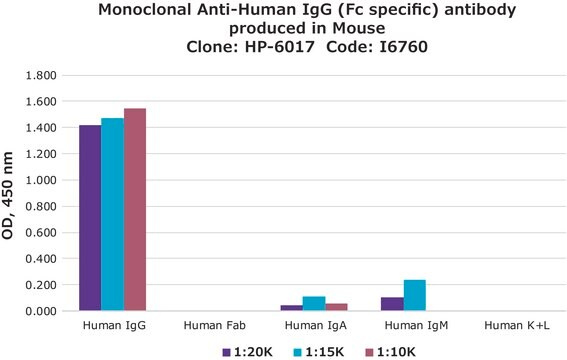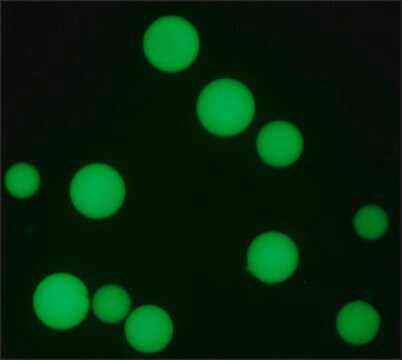推荐产品
生物源
mouse
品質等級
抗體表格
purified from hybridoma cell culture
抗體產品種類
primary antibodies
無性繁殖
8C/6-39, monoclonal
形狀
buffered aqueous solution
物種活性
human
濃度
~1 mg/mL
技術
indirect ELISA: 3-6 μg/mL using Human IgG1 myeloma protein for coating.
同型
IgG2a
運輸包裝
dry ice
儲存溫度
−20°C
目標翻譯後修改
unmodified
一般說明
Human IgGs consist of four subclasses (1-4) that can be recognized by antigenic differences in their heavy chains. They constitute approximately 65, 30, 5 and 4% of the total IgG, respectively. Each subclass has different biological and physiochemical properties. The IgG subclass may be preferentially produced in response to different antigens and pathological conditions. For instance, anti-polysaccharide responses are mainly of the IgG2 subclass while protein antigens give rise to IgG1 and IgG3 antibodies. Human IgG1 is the predominant subclass of in vivo and in vitro produced anti-tetanus toxoid antibodies. IgG1 and IgG3 are the only subclasses capable of adherence to mononuclear phagocytes and are recognized readily by the Fc receptors on various reticulo-endothelial cells while IgG2 and IgG4 are far less efficient. The amount of the different IgG subclasses present in the bloodstream varies with age. For example, IgG1 and IgG3 reach normal adult levels by 5-7 years of age while IgG2 and IgG4 levels raise more slowly, reaching adult levels at about 10 years of age. Serum IgG subclass deficiencies have been recorded for different patient groups. For example, a disproportionate elevation of IgG1 has been found in the cerebral spinal fluid of patients with multiple sclerosis. Examination of the distribution pattern of IgG subclasses in different types of diseases may provide insight into the immunological processes involved and thus may assist in the diagnosis of various disorders.
免疫原
The Fc fragment of a human IgG1 myeloma protein.
應用
Indirect ELISA: a working concentration of 3-6 μg/mL is recommended using 10 μg/mL Human IgG1 myeloma protein for coating.
外觀
Solution in 0.01 M phosphate buffered saline, pH 7.4, containing 15mM sodium azide.
其他說明
In order to obtain best results in different techniques and preparations we recommend determining optimal working concentration by titration test.
未找到合适的产品?
试试我们的产品选型工具.
儲存類別代碼
10 - Combustible liquids
水污染物質分類(WGK)
WGK 3
閃點(°F)
Not applicable
閃點(°C)
Not applicable
其他客户在看
B Rocchelli et al.
European neurology, 22(1), 35-42 (1983-01-01)
The IgG oligoclonal bands in CSF can be found in high percentage of MS patients but the existence of a limited number of cases with CSF normal IgG profile is known as well. In the present study 63 out of
R Stevens et al.
Journal of clinical immunology, 3(1), 65-69 (1983-01-01)
Peripheral blood leukocytes from individuals immunized with tetanus toxoid can be stimulated by pokeweed mitogen to produce IgG anti-tetanus toxoid antibody (IgG-Tet) in vitro. Previous studies have shown that treatment of these cells with tetanus toxoid or anti-human IgG reagents
F W van der Meulen et al.
British journal of haematology, 46(1), 47-56 (1980-09-01)
The purpose of this study was to determine whether quantitative or qualitative factors are of major importance in the destruction of red cells sensitized with incomplete warm autoantibodies of subclass IgG1. To that end, the relative amount of igG1 antibody
R Jefferis et al.
Immunology letters, 10(3-4), 223-252 (1985-01-01)
Seventy-four monoclonal antibodies (McAb) of putative specificity for human IgG (11), the IgG sub-classes (59) or Gm allotypes (4) have been evaluated for reactivity and specificity in eight laboratories employing different assay techniques or protocols. For the IgG, IgG3, IgG4
我们的科学家团队拥有各种研究领域经验,包括生命科学、材料科学、化学合成、色谱、分析及许多其他领域.
联系技术服务部门